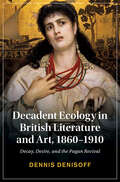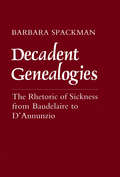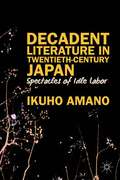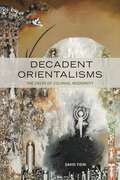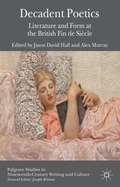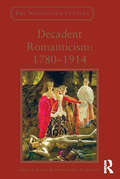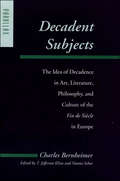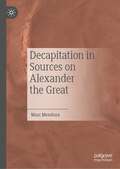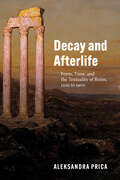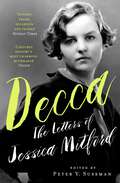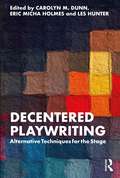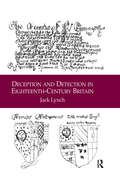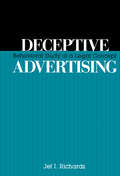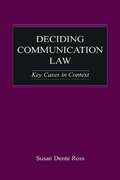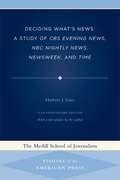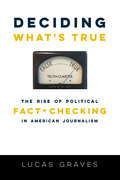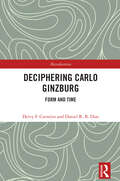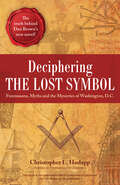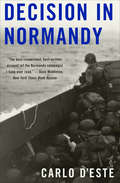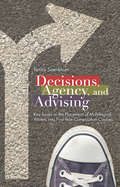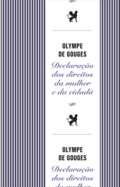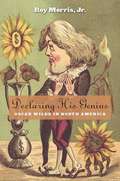- Table View
- List View
Decadent Ecology in British Literature and Art, 1860–1910: Decay, Desire, and the Pagan Revival (Cambridge Studies in Nineteenth-Century Literature and Culture)
by Dennis DenisoffCasting fresh light on late nineteenth- and early twentieth-century British art, literature, ecological science and paganism, Decadent Ecology reveals the pervasive influence of decadence and paganism on modern understandings of nature and the environment, queer and feminist politics, national identities, and changing social hierarchies. Combining scholarship in the environmental humanities with aesthetic and literary theory, this interdisciplinary study digs into works by Simeon Solomon, Algernon Swinburne, Walter Pater, Robert Louis Stevenson, Vernon Lee, Michael Field, Arthur Machen and others to address trans-temporal, trans-species intimacy; the vagabondage of place; the erotics of decomposition; occult ecology; decadent feminism; and neo-paganism. Decadent Ecology reveals the mutually influential relationship of art and science during the formulation of modern ecological, environmental, evolutionary and trans-national discourses, while also highlighting the dissident dynamism of new and recuperative pagan spiritualities - primarily Celtic, Nordic-Germanic, Greco-Roman and Egyptian - in the framing of personal, social and national identities.
Decadent Genealogies: The Rhetoric of Sickness from Baudelaire to D'Annunzio
by Barbara SpackmanBarbara Spackman here examines the ways in which decadent writers adopted the language of physiological illness and alteration as a figure for psychic otherness. By means of an ideological and rhetorical analysis of scientific as well as literary texts, she shows how the rhetoric of sickness provided the male decadent writer with an alibi for the occupation and appropriation of the female body.
Decadent Literature In Twentieth-century Japan
by Ikuho AmanoDecadence is a concept that designates a given historical moment as a phase of decay and valorizes the past as an irretrievable golden age. This study offers an innovative examination of a century of Japanese fiction through the analytical prism of decadence.
Decadent Orientalisms: The Decay of Colonial Modernity
by David FieniDecadent Orientalisms presents a sustained critique of the ways Orientalism and decadence have formed a joint discursive mode of the imperial imagination. Attentive to historical and literary configurations of language, race, religion, and power, Fieni shows the importance of understanding Western discourses of Eastern decline and obsolescence together with Arab and Islamic responses in which the language of decadence returns as a characteristic of the West.Taking seriously Edward Said’s claim that Orientalism is a “style of having power,” Fieni works historically through the aesthetic and ideological effects of Orientalist style, showing how it is at once comparative, descriptive, and performative. Orientalism, the book argues, relies upon decadence as the figure through which its positivist scientific claims become redistributed as speech acts—“truths” that establish dominance. Rather than attending to Orientalism as a repertoire of clichés and stereotypes, Decadent Orientalisms considers the systemic epistemological consequences of the diffuse, yet coherent network of institutions that have constituted Orientalism’s power.
Decadent Poetics
by Alex Murray Jason David HallDecadent Poetics has gathered together some of the most important scholars working in Victorian studies, with the ten essays here exploring the complex and vexed topic of decadent literature's formal characteristics. Invigorated by shifts in Victorian studies over the past ten years, this collection interrogates previously held assumptions around the nature of decadent form. The term 'poetics' conveys here not just the prosodic, but the multiplicitous forms of cultural production across the fin de siecle. From perfume to the post-human, theatre to attenuated textualities, these essays explore the ways in which the literary intersects with its others in the period. The range of writers studied here moves from those who now constitute a decadent canon - Oscar Wilde, 'Michael Field', Charles Baudelaire, Algernon Charles Swinburne and Ernest Dowson - to those whose work still inhabits the scholarly margins: A. E. Housman, Arthur Machen, Hubert Crackanthorpe and Graham R. Tomson. "
Decadent Romanticism: 1780-1914
by Kostas Boyiopoulos Mark SandyFor Decadent authors, Romanticism was a source of powerful imaginative revisionism, perversion, transition, and partial negation. But for all these strong Decadent reactions against the period, the cultural phenomenon of Decadence shared with Romanticism a mutual distrust of the philosophy of utilitarianism and the aesthetics of neo-Classicism. Reflecting on the interstices between Romantic and Decadent literature, Decadent Romanticism reassesses the diverse and creative reactions of Decadent authors to Romanticism between 1780 and 1914, while also remaining alert to the prescience of the Romantic imagination to envisage its own distorted, darker, perverted, other self. Creative pairings include William Blake and his Decadent critics, the recurring figure of the sphinx in the work of Thomas De Quincey and Decadent writers, and Percy Shelley with both Mathilde Blind and Swinburne. Not surprisingly, John Keats’s works are a particular focus, in essays that explore Keats’s literary and visual legacies and his resonance for writers who considered him an icon of art for art’s sake. Crucial to this critical reassessment are the shared obsessions of Romanticism and Decadence with subjectivity, isolation, addiction, fragmentation, representation, romance, and voyeurism, as well as a poetics of desire and anxieties over the purpose of aestheticism.
Decadent Subjects: The Idea of Decadence in Art, Literature, Philosophy, and Culture of the Fin de Siècle in Europe (Parallax: Re-visions Of Culture And Society Ser.)
by Charles BernheimerAn illuminating exploration of fin de siècle decadence “by a well-known authority in the areas of European literature, culture, and psychoanalysis” (Pre-Raphaelite Studies).The influential writer and scholar Charles Bernheimer described decadence as a “stimulant that bends thought out of shape, deforming traditional conceptual molds.” In this posthumously published work, Bernheimer succeeds in making a critical concept out of this perennially fashionable, rarely understood term.This remarkable collection of essays shows the contradictions of the phenomenon, which is both a condition and a state of mind. In seeking to show why people have failed to give a satisfactory account of the term decadence, Bernheimer argues that we often mistakenly take decadence to represent something concrete, that we see as some sort of agent. His salutary response is to return to those authors and artists whose work constitutes the topos of decadence, rereading key late nineteenth-century authors such as Nietzsche, Zola, Hardy, Wilde, Moreau, and Freud to rediscover the very dynamics of the decadent. Through careful analysis of the literature, art, and music of the fin de siècle—including a riveting discussion of the many faces of Salome—Bernheimer leaves us with a fascinating and multidimensional look at decadence.Honorable Mention for the Aldo and Jeanne Scaglione Prize for Comparative Literary Studies from the Modern Language Association
Decadent Subjects: The Idea of Decadence in Art, Literature, Philosophy, and Culture of the Fin de Siècle in Europe (Parallax: Re-visions of Culture and Society)
by Charles BernheimerHonorable Mention for the Aldo and Jeanne Scaglione Prize for Comparative Literary Studies from the Modern Language AssociationCharles Bernheimer described decadence as a "stimulant that bends thought out of shape, deforming traditional conceptual molds." In this posthumously published work, Bernheimer succeeds in making a critical concept out of this perennially fashionable, rarely understood term.Decadent Subjects is a coherent and moving picture of fin de siècle decadence. Mature, ironic, iconoclastic, and thoughtful, this remarkable collection of essays shows the contradictions of the phenomenon, which is both a condition and a state of mind. In seeking to show why people have failed to give a satisfactory account of the term decadence, Bernheimer argues that we often mistakenly take decadence to represent something concrete, that we see as some sort of agent. His salutary response is to return to those authors and artists whose work constitutes the topos of decadence, rereading key late nineteenth-century authors such as Nietzsche, Zola, Hardy, Wilde, Moreau, and Freud to rediscover the very dynamics of the decadent. Through careful analysis of the literature, art, and music of the fin de siècle including a riveting discussion of the many faces of Salome, Bernheimer leaves us with a fascinating and multidimensional look at decadence, all the more important as we emerge from our own fin de siècle.
Decapitation in Sources on Alexander the Great
by Marc MendozaThis book explores cases of decapitation found in sources on the reign of Alexander the Great. Despite the enormous literature on the career of Alexander the Great, this is the first study on the characterisation of violent deaths during his hectic reign. This historiographical omission has involved the tacit and blind acceptance of the details found in the ancient sources. Therefore, this book seeks to illustrate how cultural expectations, literary models, and ideological taboos shaped these accounts and argues for a close and critical reading of the sources. Given the different cultural considerations surrounding decapitation in Greek and Roman cultures, this book illustrates how those biases could have differently shaped certain episodes depending on the ultimate writer.This book, therefore, can be especially interesting for scholars focused on the career of Alexander the Great, but also valuable for other Classicists, philologists, and even for anthropologists because it represents a good case of study of cultural symbolism of violent death, semantics of power, imperial domination and the confrontation between opposite cultural appreciations of a practice.
Decay and Afterlife: Form, Time, and the Textuality of Ruins, 1100 to 1900
by Aleksandra PricaCovering 800 years of intellectual and literary history, Prica considers the textual forms of ruins. Western ruins have long been understood as objects riddled with temporal contradictions, whether they appear in baroque poetry and drama, Romanticism’s nostalgic view of history, eighteenth-century paintings of classical subjects, or even recent photographic histories of the ruins of postindustrial Detroit. Decay and Afterlife pivots away from our immediate, visual fascination with ruins, focusing instead on the textuality of ruins in works about disintegration and survival. Combining an impressive array of literary, philosophical, and historiographical works both canonical and neglected, and encompassing Latin, Italian, French, German, and English sources, Aleksandra Prica addresses ruins as textual forms, examining them in their extraordinary geographical and temporal breadth, highlighting their variability and reflexivity, and uncovering new lines of aesthetic and intellectual affinity. Through close readings, she traverses eight hundred years of intellectual and literary history, from Seneca and Petrarch to Hegel, Goethe, and Georg Simmel. She tracks European discourses on ruins as they metamorphose over time, identifying surprising resemblances and resonances, ignored contrasts and tensions, as well as the shared apprehensions and ideas that come to light in the excavation of these discourses.
Decca: The Letters of Jessica Mitford
by Jessica Mitford'These letters are a treat ... as an example of what a woman can do once she has rid herself of, or at least decided to ignore, the expectations of others - family, men, society - Jessica Mitford will always take some beating' OBSERVER'Captures history's most charming muckraker, from her friendships with Katharine Graham and Maya Angelou to her devotion to civil rights' VOGUE'Jessica Mitford is a sister of mine. If I had to go into a room with a leopard, I wouldn't hesitate to ask for her' Maya AngelouOver her 78 years, Decca's letters reveal a remarkable life - from her childhood as the daughter of a British peer to her scandalous elopement to the Spanish Civil War with her cousin, to her life in the USA, where she married a radical lawyer. The Mitford girls included Diana (who married the British fascist leader Oswald Mosley), Unity (who was close to Adolf Hitler) and Debo (who became the Duchess of Devonshire). Decca shocked them all when she joined the American Communist Party. Her letters are the stories of a century: gossip and politics, war and mores, the wonders of rapid technological change, the poignancy of personal struggles. They are also a record of her never-ending quest for social justice. This is a fascinating collection that reveals to us intimately the most ebullient Mitford of them all.
Decentered Playwriting: Alternative Techniques for the Stage
by Carolyn M. DunnDecentered Playwriting investigates new and alternative strategies for dramatic writing that incorporate non-Western, Indigenous, and underrepresented storytelling techniques and traditions while deepening a creative practice that decenters hegemonic methods. A collection of short essays and exercises by leading teaching artists, playwrights, and academics in the fields of playwriting and dramaturgy, this book focuses on reimagining pedagogical techniques by introducing playwrights to new storytelling methods, traditions, and ways of studying, and teaching diverse narratological practices. This is a vital and invaluable book for anyone teaching or studying playwriting, dramatic structure, storytelling at advanced undergraduate and graduate levels, or as part of their own professional practice.
Deception and Detection in Eighteenth-Century Britain
by Jack LynchIn the first extended treatment of the debates surrounding public deception in eighteenth-century Britain, Jack Lynch contends that forgery, fakery, and fraud make explicit the usually unspoken grounds on which Britons made sense of their world. Confrontations with inauthenticity, in other words, bring tacitly understood conceptions of reality to the surface. Drawing on a wide range of contemporary print and manuscript sources”not only books and pamphlets, but ballads, comic prints, legal proceedings, letters, and diaries”Lynch focuses on the debates they provoked, rather than the forgers themselves. He offers a comprehensive treatment of the criticism surrounding fraud in most of the noteworthy controversies of the long eighteenth century. To this end, his study is structured around topics related to the arguments over deception in Britain, whether they concerned George Psalmanazar's Formosan hoax at the beginning of the eighteenth century or William Henry Ireland's Shakespearean imposture at the end. Beginning with the question of what constitutes deception and ending with an illuminating chapter on what was at stake in these debates for eighteenth-century British thinkers, Lynch's accessibly written study takes the reader through the means”whether simple, sophisticated, or tortuously argued”by which partisans on both sides struggled to define which of the apparent contradictions were sufficient to disqualify a claim to authenticity. Fakery, Lynch persuasively argues, transports us to the heart of eighteenth-century notions of the value of evidence, of the mechanisms of perception and memory, of the relationship between art and life, of historicism, and of human motivation.
Deceptive Advertising: Behavioral Study of A Legal Concept (Routledge Communication Series)
by Jef RichardsThis is the first book designed to assist behavioral scientists in the preparation of scholarly or applied research regarding deceptive advertising which will ultimately affect public policy in this area. Because there was an inadequate foundation upon which to build a program of research for this topic, a three-part solution has been devised: 1) a review of how deception is viewed and regulated 2) a theory of how consumers process deceptive information 3) a sensitive and consistent means of measuring deceptiveness. This text provides detailed discussions regarding the intersection of law and behavioral science and its application to deceptive advertising. In so doing, it offers a solid foundation upon which to base expanded behavioral research into how consumers are deceived by advertising claims, and what cognitive processes are involved in that deception.
Deciding Communication Law: Key Cases in Context (Routledge Communication Series)
by Susan Dente RossThis clearly written and well-focused volume combines concise decisions of the primary areas of communication law with the foundational case decisions in those domains. Thus, in one volume, students of communication law, constitutional law, political science, and related fields find both the key rulings that define each area of law and a detailed summary of the legal concepts, doctrines, and policies so vital to understanding the rulings within their legal context. The text forgoes the tendency to provide encyclopedic treatment of all the relevant cases and focuses instead on the two or three cases most vital to an accurate and informed understanding of the current state of each field of communication law. The chapters provide readers with the most salient concepts and the necessary depth to understand the law while permitting most reading time to be directed to the law itself. Full-text rulings allow readers to immerse themselves in the law itself--to develop a feel for its complexity, its flexibility, and its language. Useful as a quick reference to the landmark rulings and the jurisprudence of communication law, this book also serves well as the primary text in related undergraduate courses or as a supplemental text in graduate classes in the field.
Deciding What's News: A Study of CBS Evening News, NBC Nightly News, Newsweek, and Time (Medill Visions of the American Press)
by Herbert Gans<p>For ten years, Herbert J. Gans spent considerable time in four major television and magazine newsrooms, observing and talking to the journalists who choose the national news stories that inform America about itself. Writing during the golden age of journalism, Gans included such headline events as the War on Poverty, the Vietnam War and the protests against it, urban ghetto disorders, the assassinations of Martin Luther King, Jr. and Robert F. Kennedy, and Watergate. He was interested in the values, professional standards, and the external pressures that shaped journalists' judgments. <p>Deciding What's News has become a classic. A new preface outlines the major changes that have taken place in the news media since Gans first wrote the book, but it also suggests that the basics of news judgment and the structures of news organizations have changed little. Gans's book is still the most comprehensive sociological account of some of the country's most prominent national news media. The book received the 1979 Theatre Library Association Award and the 1980 Book Award of the National Association of Educational Broadcasters. This is the first work to be published under the Medill School of Journalism's "Visions of the American Press" imprint, a new journalism history series featuring both original volumes and reprints of important classics.</p>
Deciding What's True: The Rise of Political Fact-Checking in American Journalism
by Lucas GravesOver the past decade, American outlets such as PolitiFact, FactCheck.org, and the Washington Post's Fact Checker have shaken up the political world by holding public figures accountable for what they say. Cited across social and national news media, these verdicts can rattle a political campaign and send the White House press corps scrambling. Yet fact-checking is a fraught kind of journalism, one that challenges reporters' traditional roles as objective observers and places them at the center of white-hot, real-time debates. As these journalists are the first to admit, in a hyperpartisan world, facts can easily slip into fiction, and decisions about which claims to investigate and how to judge them are frequently denounced as unfair play.Deciding What's True draws on Lucas Graves's unique access to the members of the newsrooms leading this movement. Graves vividly recounts the routines of journalists at three of these hyperconnected, technologically innovative organizations and what informs their approach to a story. Graves also plots a compelling, personality-driven history of the fact-checking movement and its recent evolution from the blogosphere, reflecting on its revolutionary remaking of journalistic ethics and practice. His book demonstrates the ways these rising organizations depend on professional networks and media partnerships yet have also made inroads with the academic and philanthropic worlds. These networks have become a vital source of influence as fact-checking spreads around the world.
Deciding What’s True: The Rise of Political Fact-Checking in American Journalism
by Lucas GravesOver the past decade, American outlets such as PolitiFact, FactCheck.org, and the Washington Post's Fact Checker have shaken up the political world by holding public figures accountable for what they say. Cited across social and national news media, these verdicts can rattle a political campaign and send the White House press corps scrambling. Yet fact-checking is a fraught kind of journalism, one that challenges reporters' traditional roles as objective observers and places them at the center of white-hot, real-time debates. As these journalists are the first to admit, in a hyperpartisan world, facts can easily slip into fiction, and decisions about which claims to investigate and how to judge them are frequently denounced as unfair play. Deciding What's True draws on Lucas Graves's unique access to the members of the newsrooms leading this movement. Graves vividly recounts the routines of journalists at three of these hyperconnected, technologically innovative organizations and what informs their approach to a story. Graves also plots a compelling, personality-driven history of the fact-checking movement and its recent evolution from the blogosphere, reflecting on its revolutionary remaking of journalistic ethics and practice. His book demonstrates the ways these rising organizations depend on professional networks and media partnerships yet have also made inroads with the academic and philanthropic worlds. These networks have become a vital source of influence as fact-checking spreads around the world.
Deciphering Carlo Ginzburg: Form and Time (ISSN)
by Deivy F. Carneiro Daniel R. DiasThis book offers an original reading of Carlo Ginzburg’s work, tracing his trajectory in the context of Italian micro-history, his debates on the objectivity of historical knowledge, and the connection of his work to the expanded perspectives constructed in recent decades by global history.Ginzburg's theories have achieved notoriety not only in the field of history but also among the wider public. This volume uses Ginzburg’s own aesthetic and intellectual practices in its analysis, and it deciphers the elements that drove and influenced the making of his work. By highlighting the procedures that Ginzburg has constructed to respond to problems of cultural history, the book also pays close attention to Erich Auerbach and Aby Warburg, whose influences played a crucial role in reformulating Ginzburg’s conception of micro-history. From there, the volume demonstrates the radicality of Ginzburg's micro-history through the discussion of some of his most recent contributions to international historiographical debates.Thought-provoking and thoroughly researched, Deciphering Carlo Ginzburg is an innovative study in Ginzburg’s methods and theories.
Deciphering the Lost Symbol: Freemasons, Myths and the Mysteries of Washington, D.C.
by Christopher I HodappDiscover the secretive brotherhood behind Dan Brown’s The Lost Symbol in this unauthorized companion book by the author of Solomon’s Builders.Freemason influence on the founding of Washington, D.C., is evident throughout the city’s buildings, statues and monuments—but it’s written in coded symbols that few people understand. Dan Brown’s thriller sends symbologist detective Robert Langdon through the capital to unravel its Masonic secrets. Now in Deciphering The Lost Symbol, Freemason expert Christopher L. Hodapp compares each clue and plot twist in Brown’s story to the true facts.•Discover the meaning of “The Lost Word”•Decode Masonic and alchemical symbolism•Explore the innermost rooms of Masonic lodges and temples•Visit the restricted area of the U.S. Capitol and other landmarks•Uncover secret patterns in Washington, D.C.’s maps and monuments•Crack the codes buried in The Lost Symbol’s artwork and puzzles“Confident in recommending it to everyone, Mason and non-mason alike. This is the perfect a compliment to The Lost Symbol and I feel it should be on the shelf right next to it on your bookcase.” —David Naughton-Shires, Masonic Art Exchange
Decision in Normandy
by Carlo D'EsteThe strategy and planning behind D-Day: &“The best-researched, best-written account [of the Normandy Campaign] I have ever read.&”—The New York Times Book Review One of the most controversial and dangerous military operations in the history of modern warfare, the battle for Normandy took over two years of planning by each country that made up the Allied forces. The event is mired to this day in myth and misconception, and untangling the web of work that led to D-Day is nearly as daunting as the work that led to the day itself. Drawing from declassified documents, personal interviews, diaries, and more, Carlo D&’Este, a winner of the Pritzker Award, uncovers what really happened in Normandy. From what went right to what went wrong, D&’Este takes readers on a journey from the very first moment Prime Minister Churchill considered an invasion through France to the last battles of World War II. With photos, maps, and first-hand accounts, readers can trace the incredible road to victory and the intricate battles in between. A comprehensive look into the military strategy surrounding the Second World War, Decision in Normandy is an absolute essential for history buffs. &“A fresh perspective on the leadership of Field Marshal Bernard Montgomery and the Allied landings after D-Day.&”—Publishers Weekly &“Again and again he reveals new facets of familiar subjects—in part from his own dual American army and British academic background; in part by querying everyone and everything.&”—Kirkus Reviews
Decisions, Agency, and Advising: Key Issues in the Placement of Multilingual Writers into First-Year Composition Courses
by Tanita SaenkhumDecisions, Agency, and Advising considers the role of students’ own agency in the placement of multilingual writers—including international students and US residents or citizens who are nonnative users of English—in US college composition programs. Grounded in qualitative research and concerned equally with theory and practice, the book explores how multilingual students exercise agency in their placement decisions and how student agency can inform the overall programmatic placement of multilingual students into first-year composition courses. Tanita Saenkhum follows eleven multilingual students who made their decisions about placement into first-year composition courses during one academic year at a large public university. She identifies the need for the process of making placement decisions to be understood more clearly, describes how to use that knowledge to improve placement practices for these students—particularly in advising—and offers hands-on recommendations for writing programs. Decisions, Agency, and Advising is a significant contribution to the field and particularly valuable to writing program administrators, academic advisors, writing teachers, researchers investigating second language writing and writing program administration, composition and second language writing scholars, and graduate students.
Declaration
by Tom MaschlerEssays from prominent writers about the state of civilization today. Contributions from writers including, Colin Wilson, John Osborne, John Wain, Kenneth Tynan, Bill Hopkins, Lindsay Anderson, Stuart Holroyd, and Doris Lessing.
Declaração dos Direitos da Mulher e da Cidadã
by Isabel Robalinho Christine Escallier Olympe De Gouges Elisa SeixasEm cada ano, desde 10 de Dezembro de 1948, o mundo celebra a adopção da Declaração Universal dos Direitos do Homem pela Assembleia-geral das Nações Unidas. Este dia capital convoca e recorda que todos os seres humanos são iguais por direito. Esta publicação acontece no âmbito de uma certa efervescência editorial e política contemporânea, a propósito de Olympe de Gouges. (...) Contudo, não se trata somente de celebrar uma personagem, durante muito tempo ignorada, mas também de considerar o que, no pensamento de Olympe de Gouges, se mantém atual: igualdade das mulheres/igualdade dos sexos, não-violência, justiça social, denúncia da escravatura e do racismo, defesa das minorias...
Declaring His Genius: Oscar Wilde in North America
by Roy Morris Jr.Arriving at the port of New York in 1882, a 27-year-old Oscar Wilde quipped he had nothing to declare but my genius. But as this sparkling narrative reveals, Wilde was, rarely for him, underselling himself. A chronicle of his sensational eleven-month speaking tour of America, Declaring His Genius offers an indelible portrait of both Oscar Wilde and the Gilded Age. Neither Wilde nor America would ever be the same.
